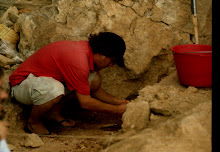The rapid physical evolution also sparked changes in the lizard's social and behavioral structure, he said. For one, the plentiful food sources allowed for easier reproduction and a denser population.
The lizard also dropped some of its territorial defenses, the authors concluded.
Such physical transformation in just 30 lizard generations takes evolution to a whole new level, Irschick said.
It would be akin to humans evolving and growing a new appendix in several hundred years, he said.
"That's unparalleled. What's most important is how fast this is," he said.
Neat stuff. The report includes some cautionary statements by a McGill biology professor (Andrew Hendry), but overall's he seems on board with the gist of the study. The article version of the study can be found by clicking here, and some good comments were provided on several blogs, including Pharyngula and GrrrlScientist.

No comments:
Post a Comment